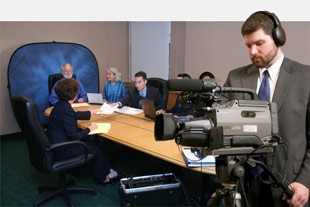Leading Benefits of Using Lawful Videography for Depositions and Tests
The assimilation of legal videography into depositions and trials provides a range of compelling benefits that can dramatically affect the effectiveness of legal process. By capturing witness testimonies in a dynamic style, legal videography not only improves the presentation of proof but likewise reinforces witness trustworthiness through the preservation of both spoken and non-verbal signs.
Improved Proof Discussion


In the realm of legal procedures, the usage of video recordings has actually changed the method evidence exists in court. Legal videography provides a vibrant and appealing tool for showcasing critical proof, making complex information more obtainable to judges, courts, and other stakeholders. Unlike traditional written transcripts, video recordings capture not just the talked words, yet likewise the nuances of body language, tone, and disposition, which can substantially affect the interpretation of testaments and declarations.
Furthermore, video evidence permits a more compelling narrative discussion. Through visual narration, lawyers can efficiently highlight essential elements of a situation, assisting the audience's interest to critical minutes. This improved discussion can assist in a much deeper understanding of the context and ramifications of the proof being talked about.
In addition, the capability to present evidence in a multimedia format can improve the test procedure, minimizing the time needed to share info contrasted to extensive verbal explanations or checking out from records. On the whole, legal videography plays a critical function in enhancing proof discussion, guaranteeing that the details is both impactful and understandable, ultimately assisting in the search of justice.

Improved Witness Integrity
The use of legal videography considerably boosts the trustworthiness of witnesses throughout trial proceedings. By supplying a graph of a witness's statement, lawful videography enables jurors and judges to perceive the witness's disposition, self-confidence, and authenticity. This multi-dimensional presentation can dramatically influence just how the info is gotten, commonly leading to a much more beneficial impact of the witness.
Furthermore, the tape-recorded video clip records non-verbal signs, such as body movement and faces, which can be crucial in sharing truthfulness or emotional depth. A witness who appears composed and genuine is a lot more most likely to be viewed as trustworthy than one who is just listened to via audio. Legal videography additionally removes the possibility for misconception that can happen with composed records, as the aesthetic layout supplies context that sustains the spoken word.
Furthermore, the permanence of video evidence enhances the witness's account, making it harder for opposing events to test the testimony's integrity. By incorporating lawful videography into depositions and tests, lawyers can substantially strengthen the viewed stability of their witnesses, eventually enhancing the general effectiveness of their situation.
Accurate Deposition Records
Just how can accurate deposition records impact the end result of an instance? Accurate deposition documents play a critical duty in legal procedures, acting as vital evidence that mirrors the integrity and integrity of witness testaments (legal videography). These documents provide a verbatim account of declarations made during depositions, making sure that all nuances, inflections, and contexts are maintained. This accuracy is essential when developing the facts of a case, as it allows lawyers to reference specific expressions or assertions made by witnesses, lowering the risk of misconception.
Moreover, legal videography boosts the precision of deposition documents by capturing the visual and acoustic aspects of the statement. This includes body movement, tone of voice, and face expressions, why not try here which can offer extra context to the talked words. Such comprehensive records make it possible for lawyers to craft even more compelling arguments, as they can conveniently corroborate cases with straight proof.
Furthermore, exact like this deposition records can simplify the trial procedure, reducing conflicts over what was said and permitting a much more reliable discussion of evidence. Ultimately, the mix of written records and video clip recordings cultivates a clearer understanding of witness testaments, substantially affecting the situation's end result.
Psychological Influence On Jurors
Jurors typically locate themselves affected by the emotional weight of the testaments they witness during a test. The visual and acoustic components of lawful videography boost this psychological vibration, enabling jurors to view the nuances of witness expressions, tone, and body language. These variables play a crucial function fit jurors' understandings of reliability and integrity.
When jurors see a witness recounting a stressful experience, the psychological gravity captured on video usually generates compassion and involvement. This can be especially impactful in situations where the human component is central, such as injury or family members regulation issues. The capacity to link with a witness's feelings promotes a deeper understanding of the case, making jurors most likely to associate with the narrative being provided.
Additionally, video clip statements can convey a sense of credibility that may be shed in composed transcripts or audio recordings. Jurors are not only taking in details; they are also experiencing the story, which can substantially affect their considerations. This way, lawful videography acts as a powerful view it now tool to stimulate feelings, ultimately assisting jurors toward a more enlightened and thoughtful judgment.
Affordable Litigation Device
Legal videography not only enhances the psychological effect of witness testaments yet likewise works as an economical litigation device. By giving a visual document of depositions and testaments, legal videography can dramatically reduce the expenses related to conventional test preparation and discussion.
First, it minimizes the need for considerable witness traveling and accommodations. Rather than bringing multiple witnesses to court, their videotaped depositions can be played throughout the trial. legal videography. This not only reduces travel expenditures but additionally enables a more structured presentation, as attorneys can concentrate on the most significant testimonies
In addition, legal videography can limit the quantity of time invested in test. By effectively providing witness accounts and proof, lawyers can expedite procedures, which translates to reduce lawyer fees and decreased courtroom expenses. The clearness and credibility of video clip recordings frequently lead to quicker court choices, potentially shortening the test period.
In an age where budgets are increasingly inspected, utilizing legal videography can supply substantial cost savings while enhancing the total high quality of an instance presentation. Its dual advantages of cost-effectiveness and boosted communication make it an important tool in contemporary litigation.
Conclusion
In summary, legal videography substantially enhances the effectiveness of depositions and trials. Its capacity to present evidence comprehensively, enhance witness integrity, and give accurate documents adds to an extra transparent legal procedure.